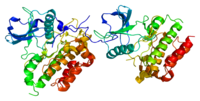
Photo from wikipedia
Imatinib, a small-molecule tyrosine kinase inhibitor, has shown good clinical activity by inhibiting adenosine triphosphate (ATP) binding to the receptor. Unfortunately, majority of patients eventually develop drug resistance, which limits… Click to show full abstract
Imatinib, a small-molecule tyrosine kinase inhibitor, has shown good clinical activity by inhibiting adenosine triphosphate (ATP) binding to the receptor. Unfortunately, majority of patients eventually develop drug resistance, which limits the long-term benefits of the tyrosine kinase inhibitors and poses a significant challenge in the clinical management of GIST. The aim of our study was to explore the feasibility of blocking KIT dimerisation upstream of the phosphorylation in imatinib-resistant GIST. KITMAb was prepared using hybridoma technique. The biological function of KITMAb was examined in KIT-dimer-expressing cells constructed by transfecting with liposomes using enzyme linked immunosorbent assay (ELISA), immunohistochemistry, western blot, MTT, Annexin V/FITC, and flow cytometry assay, respectively. KIT-dimer was expressed in 293 cells transfected with c-kit mutated-type pcDNA3.1. Treatment of KIT-dimer-expressing cells with the KITMAb significantly decreased the expression of both KIT-dimer and other phosphorylated proteins of KIT downstream signalling pathway. Furthermore, KITMAb slowed down cell growth and reduced the proportion of cells in the proliferative phase (S + G2-M). Finally, we also found that KITMAb treatment accelerated cell apoptosis. These results indicate that KITMAb strongly inhibits KIT receptor dimerisation-mediated signalling pathway and cell growth responses in vitro. We demonstrate c-kit mutation-driven KIT auto-dimerisation prior to tyrosine kinase phosphorylation as same as the procedure in ligand-dependent signalling pathway and describe a monoclonal antibody, KITMAb, with strong affinity to the dimerisation domain of KIT that blocks the important step in both the KIT signalling pathways. Further, the results suggest that treatment with KITMAb may be potentially therapeutic in imatinib-resistant GIST.
Journal Title: Journal of Cancer Research and Clinical Oncology
Year Published: 2021
Link to full text (if available)
Share on Social Media: Sign Up to like & get
recommendations!